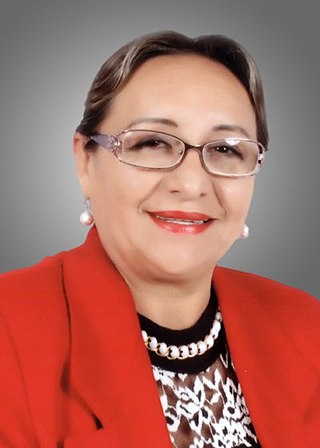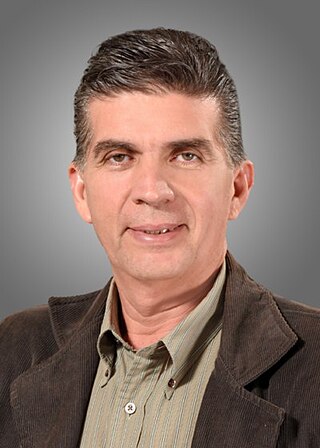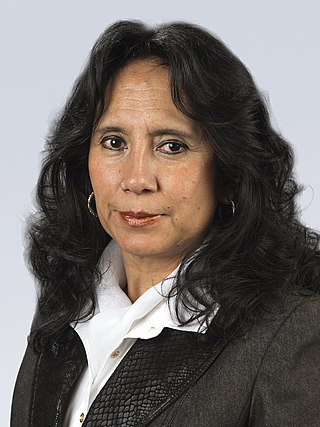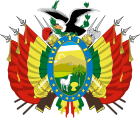
The politics of Bolivia takes place in a tree of a presidential representative democratic republic, whereby the president is head of state, head of government and head of a diverse multi-party system. Executive power is exercised by the government. Legislative power is vested in both the government and the two chambers of parliament. Both the Judiciary and the electoral branch are independent of the executive and the legislature. After the 2015 election, 53.3% of the seats in national parliament were held by women, a higher proportion of women than that of the population.

The Movement for Socialism, officially the Movement for Socialism – Political Instrument for the Sovereignty of the Peoples, is a socialist political party in Bolivia. Its followers are known as Masistas.

The 2010 Bolivian regional elections were held on 4 April 2010. Departmental and municipal authorities were elected by an electorate of approximately 5 million people. Among the officials elected are:
The first Bolivian judicial election was held on 16 October 2011. The national vote was held to elect magistrates to serve on the Supreme Court of Justice, the Plurinational Constitutional Court, the Agro-environmental Court and members of the Judiciary Council. It was originally scheduled to be held on 5 December 2010, but officials of the National Electoral Court and of the MAS majority in the Plurinational Legislative Assembly delayed it. The vote will be the first time that a Latin American country directly elects its highest judicial officials.
The 2011 Bolivian special municipal elections were held on 18 December 2011. These elections cover three of five municipalities currently without elected mayors in Bolivia: Sucre, Quillacollo, and Pazña. Elections for the Mayor of Punata will be held 29 April or 6 May 2012. Newly elected mayors will receive their credentials from the Supreme Electoral Tribunal on 27 January 2011, after which they may be sworn in.
The 2013 Beni special gubernatorial election was held on 20 January 2013. The elections were held to replace the interim governor of Beni Department with an elected executive who will serve until 2015. Numerous observers described the election as an important test of political strength in eastern Bolivia: a MAS victory would signal the retreat of the Media Luna right-wing alliance to Santa Cruz department alone; while a Beni First victory would dash MAS' political ambitions in the department.

The 2015 Extremaduran regional election was held on Sunday, 24 May 2015, to elect the 9th Assembly of the autonomous community of Extremadura. All 65 seats in the Assembly were up for election. The election was held simultaneously with regional elections in twelve other autonomous communities and local elections all throughout Spain.

Civic Community is a liberal Bolivian political coalition led by former president Carlos Mesa, founded in 2018 to contest the 2019 general election. It was born of the alliance of Revolutionary Left Front (FRI), Sovereignty and Freedom (Sol.Bo), All Organization, and Kochala Force parties. The alliance holds Mesa's presidential candidacy, with former minister Gustavo Pedraza as his running mate. The CC elected 50 deputies and 14 senators in the country's Plurinational Legislative Assembly in the election.

Yerko Martín Núñez Negrette is a Bolivian agronomist and politician who served as minister of the presidency from 2019 to 2020. A member of the Social Democratic Movement, he previously served as minister of public works from November to December 2019. Throughout his ministerial tenure, Núñez was noted as a key person of influence in the transitional government and a "right-hand" to President Jeanine Áñez, a fellow Beni native. Prior to his appointment, he served as senator from Beni from 2015 to 2019 on behalf of the Democratic Unity coalition. As a member of Beni First, Núñez served as mayor of Rurrenabaque from 2010 to 2014; he previously held the position for two terms from 2000 to 2003 and 2005 to 2010 as part of the Revolutionary Nationalist Movement. Núñez's mayoral tenure saw strides made for Rurrenabaque's ecotourism industry, which generated increased economic growth for the city.

Víctor Hugo Zamora Castedo, often referred to as Ojorico, is a Bolivian forestry engineer, politician, and former student leader who served as minister of hydrocarbons from 2019 to 2020. As a member of United to Renew, of which he was president, he previously served as senator for Tarija from 2015 to 2019 in alliance with the Christian Democratic Party. Before that, he served as a member of the Chamber of Deputies from Tarija, representing circumscription 45 from 2010 to 2014 on behalf of the National Convergence alliance. Prior to entering politics, Zamora was active in student unionism and was the chair of the Bolivian University Confederation as well as his Local University Federation. Though unsuccessful in his first electoral bid, Zamora was later given the opportunity to work in the Tarija Prefecture, and in 2004, he was invited by the Revolutionary Left Movement to contest a seat on the Tarija Municipal Council, where he served from 2005 to 2009.

The 2021 Bolivian regional elections were held on 7 March 2021. Departmental and municipal authorities were elected by an electorate of approximately 7 million people. This was the third regional election under the 2009 constitution. It was postponed from the expected date of 2020 due to the 2019 Bolivian political crisis and delays in holding the 2020 Bolivian general election. All elected authorities assumed office on 3 May.

Rodrigo Paz Pereira is a Bolivian politician serving as senator for Tarija since 2020. A member of Civic Community, he has been the leader of the First the People civic group —the alliance's primary partner in Tarija— since 2019. As a member of United to Renew, he previously served as mayor of Tarija from 2015 to 2020 and as president of the Tarija Municipal Council from 2010 to 2015. Prior to that, he served as a uninominal member of the Chamber of Deputies from Tarija representing circumscription 46 from 2005 to 2010 and circumscription 49 from 2002 to 2006, on behalf of the Revolutionary Left Movement, the party of his father, former president Jaime Paz Zamora.

Diana Patricia Paputsakis Burgos is a Bolivian lawyer, politician, and former student leader who served as secretary of women and family of Tarija from 2015 to 2019. Prior to her service in the municipal government, Paputsakis served as a substitute member Chamber of Deputies from Tarija, representing circumscription 45 under Víctor Hugo Zamora from 2010 to 2014 on behalf of the National Convergence alliance. In the 2019 general election, Paputsakis was elected to represent Tarija's circumscription 40 on behalf of Civic Community, but never took office, owing to the annulment of the electoral results and the coalition's decision not to re-nominate her in 2020. Paputsakis later contested the 2021 Tarija mayoral election, finishing sixth in the polls.

Beatriz Eliane Capobianco Sandoval is a Bolivian lawyer and politician who served as minister of rural development and lands from January to November 2020. A member of the Social Democratic Movement, she previously served as a party-list member of the Chamber of Deputies from Santa Cruz from 2015 to 2019 on behalf of the Democratic Unity coalition. Before that, she served as a member of the Constituent Assembly from Santa Cruz, representing circumscription 51 from 2006 to 2007 on behalf of the Social Democratic Power alliance. A professional in cadastre and land and real estate registration, Capobianco held numerous positions linked to Santa Cruz's agribusiness sector, including serving twice as departmental director of the National Institute of Agrarian Reform, first from 2001 to 2002 and again from 2019 to 2020.

Osney Martínez Daguer is a Bolivian agronomist, politician, and rancher who served as a party-list member of the Chamber of Deputies from Beni from 2010 to 2015. Born to a wealthy family from San Borja with political links to the Revolutionary Nationalist Movement, Martínez spent most of his career in local administration, starting as a substitute member of the city's municipal council before being twice elected to a full seat on the body.

Irma Herminia Ledezma Tambo is a Bolivian businesswoman, politician, and rancher who served as a member of the Chamber of Deputies from Beni, representing circumscription 61 from 2015 to 2020. Ledezma spent most of her professional career in the business of commerce and cattle ranching, two sectors vital to Beni's regional economy. She entered politics as a member of the Social Democratic Movement, representing the party in the Chamber of Deputies and serving as head of its Guayaramerín branch until 2020 before retiring upon the completion of her parliamentary term.

Miguel Santa Lucía Ojopi Sosa, often referred to as Yaco, is a Bolivian businessman and politician who served as a party-list member of the Chamber of Deputies from Pando from 2015 to 2020. A member of the Revolutionary Nationalist Movement, Ojopi entered politics as the party's departmental leader for Pando. In 2006, he was elected to serve as a party-list member of the Constituent Assembly for Pando from 2006 to 2007. After unsuccessfully contesting the Cobija mayoralty in 2010, Ojopi was elected to represent Pando in the Chamber of Deputies. As with other Revolutionary Nationalist Movement deputies elected as part of the Democratic Unity alliance, Ojopi split with the coalition shortly after assuming office, composing part of a quaternary opposition caucus in the lower chamber for the duration of his term.

Mirtha Natividad Arce Camacho is a Bolivian academic, lawyer, and politician who served as senator for Tarija from 2015 to 2020.

Rhina Aguirre Amézaga was a Bolivian disability activist, politician, and sociologist who served as senator for Tarija from 2010 to 2015.

Fernando Campero Paz is a Bolivian economist and politician who served as substitute senator for Tarija from 2015 to 2020. He previously served as general manager of the Central Bank of Bolivia and the Bolivian Stock Exchange during the administration of Jaime Paz Zamora.

















